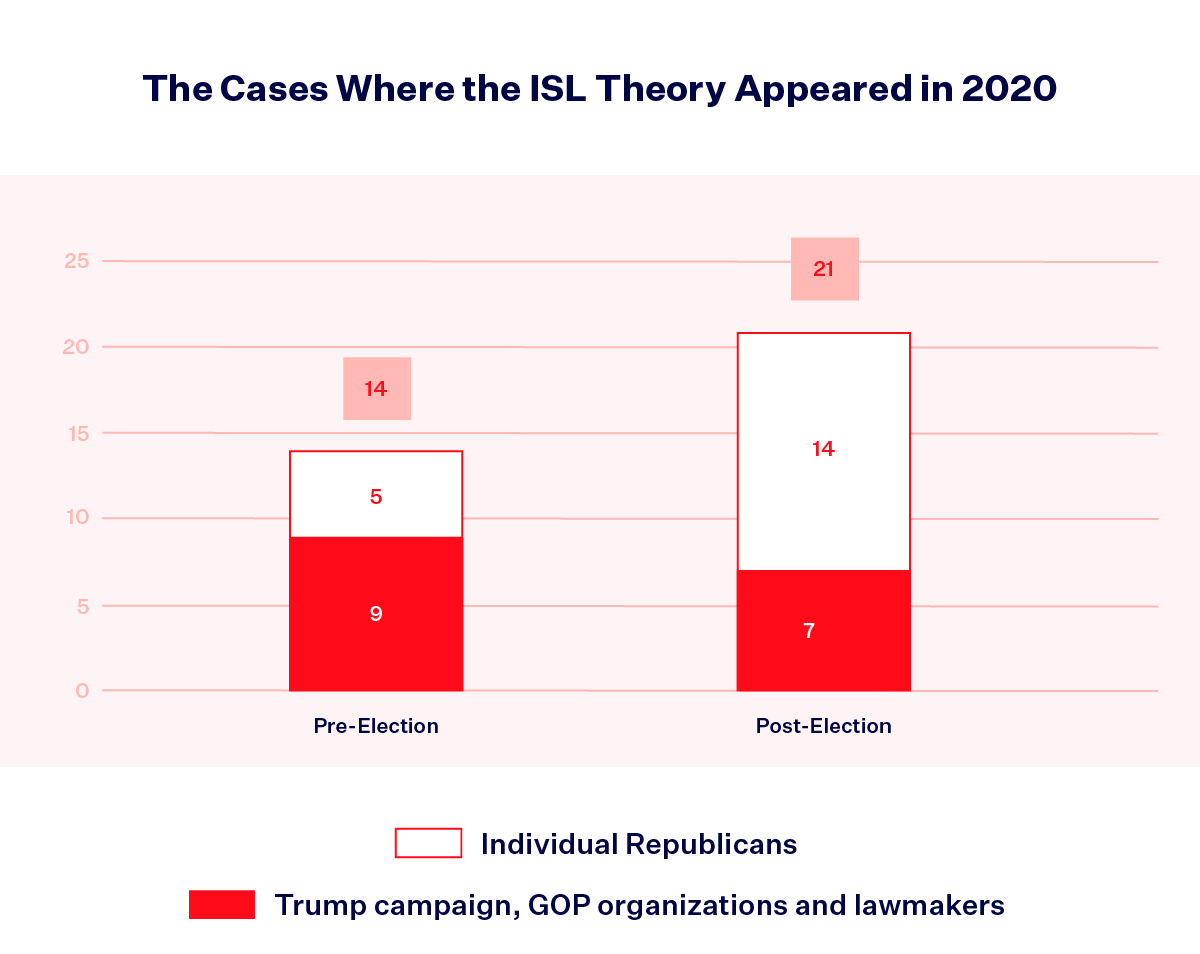How 2020 Laid the Groundwork for Moore v. Harper

In December, the U.S. Supreme Court will hear oral argument in Moore v. Harper, a redistricting lawsuit out of North Carolina that gives the Court the opportunity to consider the fringe independent state legislature (ISL) theory. The theory, based on an interpretation of the Elections Clause in Article I and the Electors Clause in Article II of the U.S. Constitution, holds that state legislatures are the only part of the state government that may set the rules for federal elections.
Even though the theory has been rejected by the Supreme Court as recently as 2015, the avalanche of litigation brought by Republicans during the 2020 election gave it new life. In case after case, they invoked the ISL theory to argue against emergency changes to election rules and, after the election, to support overturning the results. Though few of these cases were successful, Republicans’ efforts in this litigation laid the groundwork for this upcoming case by bringing a previously fringe theory into the mainstream. Now, the Court has an opportunity to endorse this undemocratic theory — with potentially dire consequences for our democracy.
The Republican Party and the Trump campaign began raising ISL theory claims leading up to the 2020 election.
In response to the COVID-19 pandemic, many states made emergency changes to election rules to accommodate increased mail-in voting or otherwise make it safer for people to cast their ballots. Since these decisions were largely made by election officials or ordered by courts instead of by the state legislatures, Republican organizations and the Trump campaign launched a coordinated challenge to these changes using the ISL theory.
In North Carolina, for example, the Trump campaign and the Republican National Committee challenged a state court agreement with the North Carolina State Board of Elections (NCSBE) that extended the state’s mail-in ballot receipt deadline, created new cure guidance (the process for voters to fix small mistakes on their mail-in ballots) and increased the number of ballot drop-off locations. The Republicans argued that this agreement “arrogantly usurp[ed] the General Assembly’s authority as granted in Article I” and that the U.S. Constitution “recognizes no situation in which the Executive Branch, or an Executive Branch agency, of a State” may modify federal election rules. Similarly, in Pennsylvania the state Republican Party and legislative leaders appealed a Pennsylvania Supreme Court ruling, which extended the state’s mail-in ballot receipt deadline, to the U.S. Supreme Court, alleging that the state court’s decision violated the U.S. Constitution because it “specifically excludes” state courts from setting federal election rules.
Republican Party committees and the Trump campaign raised these arguments throughout the country, even in blue states like New Jersey and California. In total, Democracy Docket tracked 14 lawsuits filed before Election Day in 2020 that raised ISL theory claims, with nine filed by official Republican organizations or the Trump campaign and five filed by individual Republican politicians or voters. But these pre-election lawsuits were just the beginning of the ISL theory’s 2020 moment in the spotlight.

Many of the lawsuits challenging the results of the 2020 election also raised ISL theory claims.
In his unprecedented attempt to overturn the results of the 2020 election, then-President Donald Trump and his allies repeatedly used the ISL theory as basis for their lawsuits. In the post-election lawsuits, they used the theory to argue that the election was conducted in violation of the Constitution and that the results must be discarded. In Trump v. Boockvar in Pennsylvania, the Trump campaign argued that the “unilateral decision to create a cure procedure violate[d] the Electors and Elections Clauses” and asked the court to prohibit certification of results in the Keystone State. In Trump v. Wisconsin Elections Commission, the Trump campaign asserted that procedures used in Wisconsin’s elections “usurped the Wisconsin Legislature’s exclusive authority to direct the election for Presidential electors.” The campaign contended that constitutional violations “tainted more than 50,000 ballots” and urged the court to let the Wisconsin Legislature determine how to appoint the state’s electoral votes. The campaign used the ISL theory to justify disenfranchising Americans and overturning the election in its favor.
The lawsuits filed by the Trump campaign, as in the pre-election period, were joined by an array of cases brought by individual Republicans voters and electors. Remarkably, these cases often used nearly identical language to support their arguments, including the phrase: “Neither Defendant is a ‘Legislature’ as required under the Elections Clause or Electors Clause.” The mirrored language and arguments across cases and states speak to the level of coordination in the scheme to overturn the results even outside the Trump campaign and the Republican Party’s official infrastructure.
Democracy Docket tracked 21 lawsuits in the 2020 post-election period that raised ISL theory claims, including seven from Republican organizations or Republican politicians in their official capacities. These efforts culminated in Texas v. Pennsylvania, a lawsuit filed directly in the U.S. Supreme Court by Texas Attorney General Ken Paxton (R) that sought to invalidate the results in Georgia, Michigan, Pennsylvania and Wisconsin and have their Republican-controlled state legislatures appoint electors instead.
None of these post-election lawsuits succeeded in overturning election results, and the pre-election lawsuits were met with limited success. But the lawsuits did lay the groundwork for Moore by bringing the ISL theory into the public sphere and allowing Supreme Court justices to express support for this radical theory.
Through these lawsuits, the U.S. Supreme Court signaled its willingness to revisit the ISL theory.
While the U.S. Supreme Court never weighed in on the merits of any of these cases, the justices did take the opportunity to write in support of the ISL theory. In an appeal originally stemming from Democratic National Committee v. Bostelmann, a case seeking to relax Wisconsin’s election rules in response to the pandemic, Justice Brett Kavanaugh expressed support for the theory, writing on Oct. 26, 2020 that “under the U.S. Constitution, the state courts do not have a blank check to rewrite state election laws for federal elections.” He alluded to this theory even though the Republicans in the case hadn’t originally invoked the ISL theory at all.
Just two days after Kavanaugh’s writing, Justices Samuel Alito, Clarence Thomas and Neil Gorsuch joined a statement in the aforementioned case over the Pennsylvania Supreme Court’s extension of the ballot receipt deadline. The justices invoked the theory to argue that “there is a strong likelihood that the State Supreme Court decision violates the Federal Constitution.” Later, when the U.S. Supreme Court declined to decide the appeal on the merits, Thomas dissented, writing that “[b]ecause the Federal Constitution, not state constitutions, gives state legislatures authority to regulate federal elections,” Republicans had presented a strong argument that the state Supreme Court’s decision “violated the constitution by overriding ‘the clearly expressed intent of the legislature.’” Alito and Gorsuch agreed, further writing that all the 2020 cases invoking the ISL theory “present an important and recurring constitutional question” that the U.S. Supreme Court needed to resolve.
Thus, thanks to Republican-backed lawsuits that tried to make it harder for people to vote and overturn election results, four justices had the opportunity to signal to the nation that they were interested in considering the ISL theory. With the arrival of Moore, they got their wish. Even though Trump and Republicans entered 2021 with little to show from their legal efforts, the Supreme Court could still side with them in favor of the ISL theory in this upcoming case. Such a decision could give Republicans a free hand to gerrymander with abandon and set federal election rules unchecked by state courts or other officials. If the Court endorses the theory, all the time and effort spent raising ISL theory claims in 2020 will have been more than worth it.